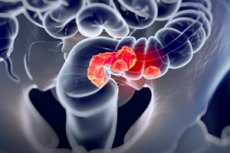New publications
Ergothioneine supercharges beneficial bacteria and inhibits carcinogenesis in the intestines
Last reviewed: 09.08.2025

All iLive content is medically reviewed or fact checked to ensure as much factual accuracy as possible.
We have strict sourcing guidelines and only link to reputable media sites, academic research institutions and, whenever possible, medically peer reviewed studies. Note that the numbers in parentheses ([1], [2], etc.) are clickable links to these studies.
If you feel that any of our content is inaccurate, out-of-date, or otherwise questionable, please select it and press Ctrl + Enter.

An international team led by the Hatzios Lab (Broad Institute and Harvard–MGH) has shown that human gut commensals exchange the common dietary antioxidant ergothioneine (EGT) to fuel their energy supply under anaerobic (oxygen-free) conditions. The study is published in the journal Cell Host and Microbe.
How did the study proceed?
- In vitro models: isolated cultures of key representatives of two large phyla – Clostridium symbiosum and Bacteroides fragilis – contained only ergothioneine in the medium as the “only” antioxidant.
- Cross-feeding: When the strains were grown together, one strain was found to convert EGT into more accessible metabolites (e.g. pyruvate and short-chain fatty acids), which were then taken up by the other, allowing both to produce ATP in the absence of O₂.
- Control experiments: Neither C. symbiosum nor B. fragilis alone could grow effectively on EGT-containing medium, whereas when paired they showed a two-fold increase in ATP production and cell biomass.
Key Findings
- The role of ergothioneine: This antioxidant, found in mushrooms, beans and whole grains, appears to be not only protective but also an energy substrate for common intestinal bacterial genera.
- Enhanced anaerobic respiration: Cross-feeding increased the activity of fermentation and NAD⁺ regeneration pathways, which are critical for survival in the oxygen-deficient colonic environment.
- Community stability: EGT exchange strengthens the structural stability of the microbial community by preventing pathobiont dominance and stimulating the production of beneficial metabolites (SCFA).
The authors note that the ergothioneine metabolic pathway was found to be more frequent in patients with colorectal cancer, which may indicate a link between microbial ergothioneine metabolism and tumor pathogenesis. This opens up prospects for the use of enzyme inhibitors or dietary modifications (e.g., increased consumption of ergothioneine-rich foods, such as mushrooms and legumes) to modulate microbiota for therapeutic purposes.
Health implications
- Nutritional ecology: In addition to dietary fiber, dietary antioxidants act as valuable fuel for “good” microbes, enhancing their contribution to short-chain fatty acid production and immune modulation.
- New prebiotics: Ergothioneine and its derivatives may become targeted prebiotics capable of “charging” beneficial anaerobes and counteracting dysbiosis.
- Therapeutic implications: By manipulating dietary EGT availability, it may be possible to improve metabolic health, reduce inflammation, and strengthen gut barrier function.
"We have shown for the first time a real mechanism of antioxidant cross-feeding that helps produce energy in anaerobic regions of the gut," says lead author Ze Zhou.
The authors highlight three key points:
Ergothioneine as a metabolic “bridge”
“We have shown for the first time that ergothioneine not only acts as an antioxidant, but also becomes an energy source for anaerobic bacteria, strengthening their populations in the colon.”Link to colorectal cancer prevention
“A strengthened microbial community produces more short-chain fatty acids, such as butyrate, which is known to protect the colon epithelium and suppress tumor growth,” adds co-author Prof. Maria Gonzalez.Prospects for prebiotic therapy
“Further research will allow the development of targeted ergothioneine-based prebiotics that could complement current strategies for screening and preventing colorectal cancer,” concludes Dr. Ze Zhou.
This work paves the way for a new generation of prebiotics based on natural antioxidants that can “kick-start” the internal bioenergetics of the microbiome and improve the health of the host.
